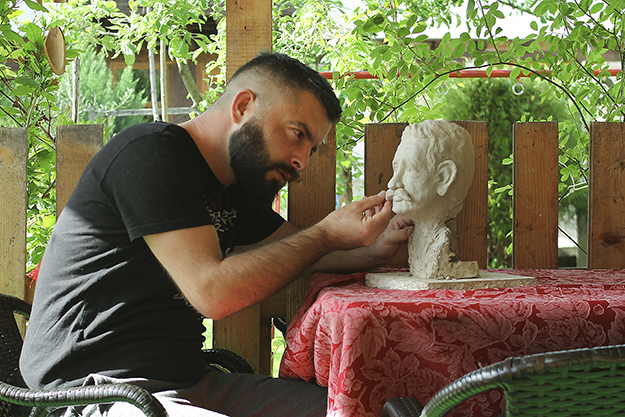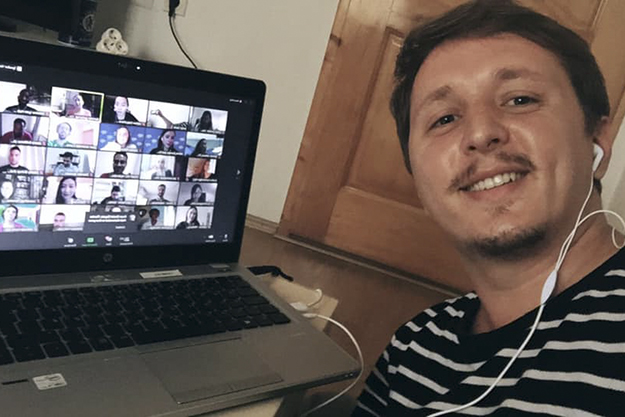Ngadhnjim Shabani discovered his passion for sculpture quite early on, and over the years he has fashioned a lot of figures from clay. He usually expresses his creativity through sculpting effigies of national figures, but in 2020 he decided to sculpt another figure that is precious to him — his grandfather. Five months later, on May 13, the effigy was virtually complete.
“It’ll maybe take two more weeks at most,” he says; it is not like there is much more work to do, so he can dedicate all day to the sculpture. During the first three months of the year, he barely spent a total week sculpting. The thirty-one-year-old’s profession is graphic design, which provides him with an income and the materials for doing sculpture.
Three years ago, he began working as a graphic designer in Prishtina, which prompted him to move close to his office. This not only separates him from his sculpting studio (i.e., his backyard) in Gjilan, but it also imposed a nine-to-five schedule, which was not the case when he worked as a freelance designer.
However, since mid-March Ngadhnjim has been stuck in his “sculpture studio” due to the COVID-19 pandemic, giving him the time to immerse himself in his passion.
The initial coronavirus infections in Kosovo were confirmed on March 13, which led to the government closing many businesses in order to contain its spread, and in the meantime it ordered many businesses to organize work so that most activities could be carried out from home. Other measures put the country under lockdown for many weeks, numerous activities were suspended, and thousands of workers were left without salaries or lost their jobs altogether.
In May, after the number of infected individuals with COVID-19 decreased and the number recoveries increased, the Ministry of Health initiated the gradual relaxation of the measures. Traffic started flooding into the cities once again, and offices reopened one after the other. But before this happened, the two months of lockdown forced many people to get used to an unusual daily life.
Let’s go back to when this all started.
Immediately after the first cases were announced on March 13, Ngadhnjim decided to return to Gjilan and made sure to bring his work computer with him. He knew he would work from home, but wasn’t sure for how long. He says that he guessed it wouldn’t last that long, ironically mentioning the “two weeks more” — a phrase often said by authorities during the pandemic.

Ngadhnjim Shabani made use of the lockdown in order to allow his passion — sculpture — to engross him. Photo by Ngadhnjim Shabani.
Bionda Rexhepi, a lawyer working on an EU project related to Kosovo’s Civil Code, also made her way to Gjilan from Prishtina that day. When the twenty-four-year-old got home, she recalls finding a lot of guests, which was not uncommon in her household. “We’re a big family and we visit each other a lot,” she says.
This time around, she found the group talking about how “they have to get up and go now.”
The first COVID-19 cases in Kosovo were from Vitia, which lies only a few kilometers away from Gjilan — meaning that citizens of these municipalities have frequent contact with each other. This contributed to the panic of the large Rexhepi family, whose minds were focused on the health of Bionda’s grandmother, who lives with them. After a discussion of how it’s good to rigorously respect the measures introduced in order to fight off the virus, the guests left.
And Bionda thought about how she would handle working from home, feeling that the situation was “somewhat enticing” since “the unknown always gives rise to emotions,” as she puts it.
Improvisation and adaptation
Teacher Fisnik Jahiri knew that he would be on a forced vacation two weeks before Ngadhnjim and Bionda. Even before there were any confirmed cases of COVID-19 in Kosovo, the government decided to close all schools in the country, and since then he has not taught chemistry at the Kuvendi i Arbërit High School in Ferizaj. What’s more, for the next two weeks after the decision, Jahiri would not teach chemistry at all.
Only on March 23 did online teaching begin in Kosovo, and this would once again get teacher Fisnik to work — yet this time, he would have to find new ways to teach his students. He has been teaching for over 16 years and says that he has learned to see “teaching first and foremost as improvisation.” And, as fate would have it, he needed to improvise in his new method of teaching.
“I have continuously insisted that students be more active than myself during chemistry lessons,” he says.
He carried out the first online lessons through text; he would summarize the lessons and attach questions at the end, which students also had to answer through text. But this did not satisfy him, so he started thinking about alternative solutions — thus he learned something new that he thinks he will use even when he returns to the classroom. He is now recording his lectures and sending them to his students through the platform established by the Ministry of Education for distance learning.
Some countries have already decided on the dates when schools will reopen.
More than two months after online teaching started, the government’s plan to gradually lift the measures against COVID-19 is ongoing. But the government does not expect to open schools before the end of the school year. In the second phase of relaxation, which began on May 18, the Ministry of Health is expected to reevaluate the opening of day care centers, whereas in the third phase, which will start on June 1, university, graduation and exit exams are expected to be held.
Meanwhile, some countries — including neighboring ones — have already decided on the dates when schools will reopen. On May 18, in Albania, high school seniors started school in order to intensify preparations for the graduation exam; in Serbia, preschools and kindergartens have been opened, and in Slovenia — where the epidemic is nearing its end — schools and kindergartens have also partially opened.
Although there was no official explanation as to why the reopening of schools is not being considered before the end of the current school year, infrastructural issues that could have contributed are widely known. In many schools, especially in urban areas, school premises overflow with students, which makes it difficult, if not impossible, to maintain physical distance.

Fisnik Jahiri, a chemistry teacher, has found new ways to convey lessons to his students during distance learning. Photo by Fisnik Jahiri.
In the meantime, to escape the noise at home to record his chemistry lessons, Fisnik uses a rental space in his building that he would normally use for his commercial business. “It’s more comfortable there, and it’s also good for preparing lessons,” Fisnik says. In his improvised classroom he also finds online chemistry quizzes and videos of chemical experiments that he sends to his students.
He is convinced that he will continue recording lectures and discussions with students even when they return in the next school year. He says that students sometimes lose focus during class, and this new method seems suitable for him because he has noticed that they can go back to previous lessons several times since they are now available in recorded form.
With or without noise?
Avdyl Gashi, director of the Global Shapers Prishtina youth organization, has also improvised in his living space in order to set up a working office. While working from home, the 26-year-old thinks that he will change some customs and methods of his work after the quarantine is lifted.
He has already downloaded a few applications that simulate a work environment by playing sound effects of conversations, people turning pages and other sounds. “I am a person who likes to be in contact with other people, I like to be dynamic,” he says.
Avdyl has started replacing the people, environment and sounds of the office, as well as the frequent meetings and conversations, with his family members. During this time he has mostly worked in the same room where his family members usually stay. “Ah, except when I have online meetings, it’s noisy,” he says, laughing, and adds that he had to deal with the same problem for his interview with K2.0.
In spite of the initial challenges, he is now accustomed to the new routine and he is considering holding most of his work meetings online in the future. “We have wasted a lot of time going from one neighborhood to the other, waiting for cabs, then waiting to come back, walking from one place to the other…,” he says, recalling his meetings before the pandemic.

For Avdyl Gashi, who is based in Prishtina, the lockdown has helped him save time that he would otherwise spend going from one meeting to the other. Photo by Avdyl Gashi.
Another change that he has noticed is the lack of a fixed working schedule, which has caused him to work much more than when he was at the office.
“Perhaps it’s psychological, when you know that you’ll finish work at five, that’s when you start doing other things — you go out for coffee or beer, watch a movie or do something else,” he says, adding that when you work from home “your laptop is right there, you’ll always find something to work on.”
He says that he has, in a way, “turned this change to his advantage” because it has increased his creativity at work.
The lack of a fixed schedule has also had a similar effect on Ngadhnjim. “Now I sleep as much as I can, and I work when I know I’m productive,” he explains. Now, he not only wakes up after nine if he wants to sleep more, he also heads over to his backyard studio when he sees that he needs some time to relax before starting design work after waking up.
“I have started doing sculpture once again since April,” he says, mostly doing it in the daytime. Meanwhile, he says that he did most of the design work “when it came to him,” which has usually happened in the late hours.
According to him, he reached a kind of understanding with his employers: “I have agreed with my bosses that work should just get done,” he says, explaining his flexible schedule during these months. Yet, he says that there have been exceptions for urgent tasks.
Bionda has also been more flexible with her schedule.The first change she has noticed is that she does not need to wake up at 5:30 a.m. anymore to commute to Prishtina. This has not only added two hours to her sleep, but it has also spared her the hassle of long waits in traffic.
Shpend Ahmeti, the mayor of Prishtina, said that the municipality will take a series of measures in order to reduce the number of cars in the city.
The Prishtina city entrance at Veternik, the Hospital Roundabout and Grand Hotel — these are the junctions where she (along with many others) get stuck for up to 40 minutes in their cars. “I have often arrived late to work,” she says, mentioning that her way to work from Veternik has frequently taken longer than driving from Gjilan to the entrance of Prishtina.
The decrease in road traffic during the pandemic has sparked a reaction by Mayor of Prishtina Shpend Ahmeti. He wrote that after the pandemic, the municipality will take a series of measures in order to reduce the number of cars in the city. According to him, tolls for cars entering the city, increased parking prices and the closure of certain roads during the weekend (and of others permanently) are being considered, as well as bicycle lanes all over town.
A slowed-down rhythm
Bionda has utilized working from home to do things that she didn’t have time for in the past.
“We have done ‘secondary’ tasks during the pandemic that we have put off while we were at work, and they pile up,” she says. “I think that after finishing those, it will be much easier to do primary things at work when we go back to the office.”
While in quarantine, activities outside of work have also helped Bionda’s productivity. She says that she has started reading books she hadn’t had time to finish in the past, as well as watching films and listening to music. She has regularly been on Netflix, saying that she is not bothered that many TV shows and movies were removed from the platform, because the ones that remain are of high quality.

Working from home has helped Bionda Rexhepi clear off secondary tasks that had been piling up. Photo by Bionda Rexhepi.
During this time she has gotten back into watching the TV show “Friends.” “It helps me relax, and their jokes are still funny today. They touch very well upon human relationships, and how people understand and misunderstand each other,” she says, talking about her favorite TV show.
She says that she has learned a lot from her quarantine experience, and she has also seen that “We can express ourselves in different ways.”
Ngadhnjim, on the other hand, believes that the comfort of home with regard to finishing tasks has had a similar effect on many other people. According to him, this will affect many companies in reviewing the way they organize work and the traditional working schedule, since “creativity and productivity has increased” in these past months.
Meanwhile, he is finishing off the sculpture of his grandfather and says that he will carve sculptures of his other family members too, jokingly saying that “they’re actually quite nice, I didn’t know it before this.”
Avdyl has also come to similar conclusions about his family. “Sometimes we don’t realize the value of family, we take it for granted — it’s there,” he says.
“Now I have noticed that they are noisy, there were some discussions and conflicts,” he continues. “But each of them has their own personality — you learn about their temperament better, or the tempo that they function at. During quarantine I have learned to respect this diversity, and to see each of my family members’ personalities.”
Teacher Fisnik, has lost every hope that his high school will have a chemistry lab in the near future. He expects that classes will be equipped with wireless internet in order to “get the students closer to chemistry, and will get them to feel it” through online videos that he will show them.
Although the home offices of the interviewees have had an effect on their creativity, productivity and commitment, they are all excited to go back to the office. “Enough is enough,” they say.K
Feature image: Atdhe Mulla / K2.0.





